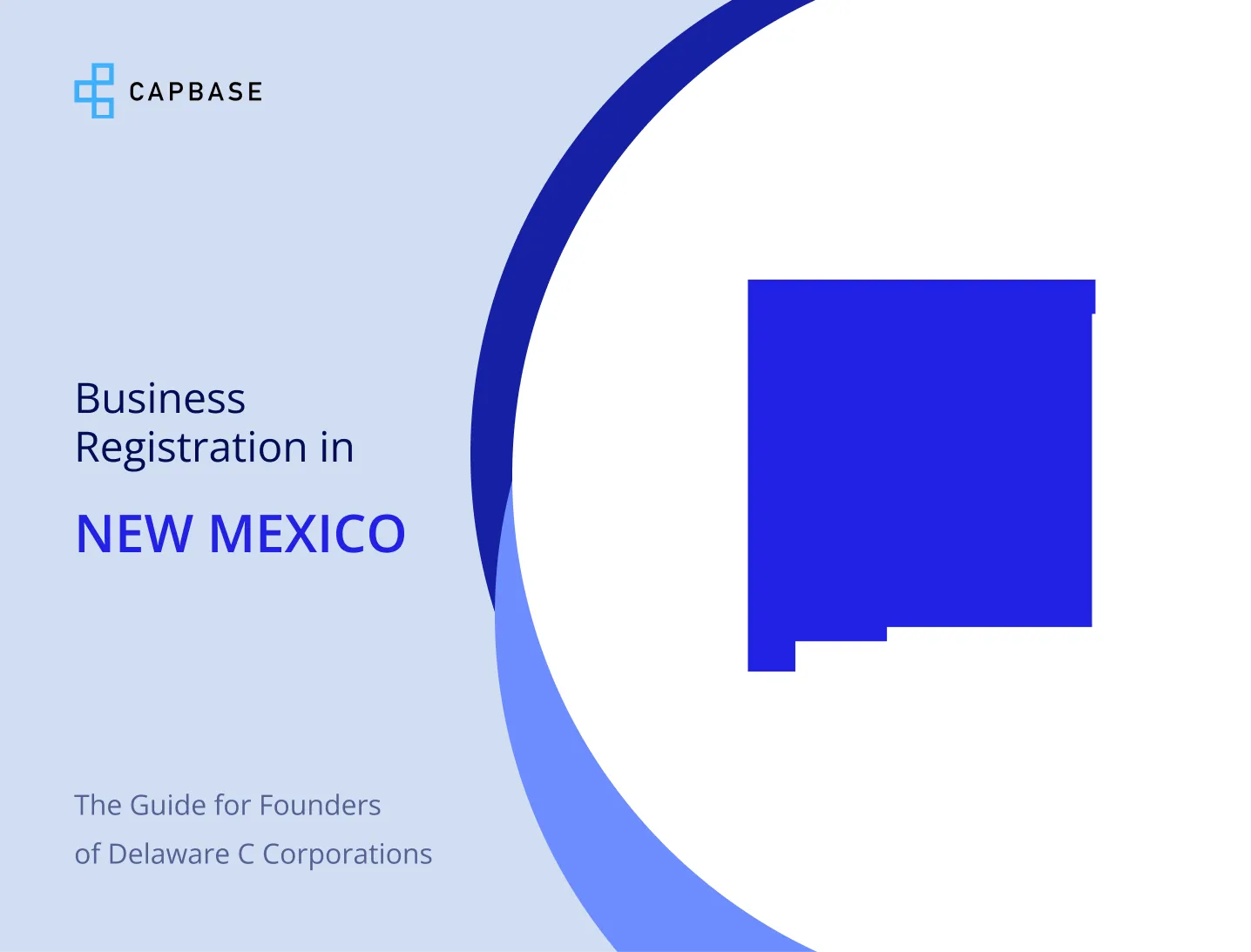
Registering Your Startup To Do Business in New Mexico
 by Capbase Staff • 7 min readpublished May 27, 2023 • updated December 4, 2023
by Capbase Staff • 7 min readpublished May 27, 2023 • updated December 4, 2023
Related

Stay ahead of the curve
You’ll get actionable advice, comprehensive guides, interviews with founders, and more.
Forming your business entity in Delaware—specifically, a corporation—gives you a lot of flexibility, but you may still need to follow local laws depending on what state you operate in.
Specifically, if you do business in New Mexico, you need to register with the state. We’ll walk through the process and simplify it. But first, how can you tell whether you’re legally doing business in New Mexico?
When to register as doing business in New Mexico
Delaware C corps—and all other corporations formed outside of New Mexico—are referred to as “foreign” corporations by the State.
New Mexico statutes do not specifically define what is considered doing business in the state. However, New Mexico statutes provide that the following activities would not require you to register with the State:
Defending or settling a lawsuit
Having a bank account in the state
Selling through independent contractors
New Mexico Sales Tax
Unlike most other states, New Mexico does not have a general sales tax on goods purchased in New Mexico. This means that you do not need to register with the New Mexico Department of Taxation and Revenue to collect sales tax in the state.
How to register to do business in New Mexico
- Select a name under which to do business. This doesn’t have to be the name you registered when incorporating in Delaware, but it can be.
- Fill out an application. You’ll need to file an Application for Certificate of Authority to the New Mexico Secretary of State along with a Delaware Certificate of Good Standing.
- Pay the fee. Now you pay the New Mexico Secretary of State a minimum $200 filing fee. Your actual filing fee depends on the amount of authorized shares your corporation has.
- Submit your Application for Certificate of Authority.
- Wait. Processing typically takes two to four weeks.
Once you’re approved to operate as a qualified foreign business in New Mexico, you’ll need to comply with certain requirements.
Compliance has a qualified business in New Mexico
To stay in compliance and continue legally doing business in New Mexico, you need to meet two requirements: maintaining a registered agent and filing your biennial report. On top of that, you will also need to pay a corporate income and franchise tax and a gross receipts tax.
Registered agent in New Mexico
Your registered agent in New Mexico is your point of contact with local authorities. If you don’t have a physical address for your company in New Mexico, it may be advantageous to find a registered agent to receive state notices on your behalf.
Foreign corporations are required to have a registered office in New Mexico. The office cannot be a P.O. box, rather it must be a physical address of your registered agent or a licensed registered agent service.
Your registered agent will forward any important information, such as business mail, to you. There are a number of firms that contract out registered agents. They typically cost $50 – $100 per year.
Biennial reporting/renewal in New Mexico
Every two years, you must file a statement with the State, updating any changes to the company address or the composition of the Board and officers. You’ll include info like:
- The legal name of your business
- The name and address of your registered agent
- The names and addresses of board members, managers, and officers
The filing fee for the biennial report is $25.
Paying your corporation income and franchise tax
New Mexico has a corporate income and franchise tax. The corporate income tax is a direct tax imposed on the net income of your corporation. The franchise tax is typically calculated based on the net worth of or capital held by the corporation. For more information on filing and paying your corporate income and franchise tax, please see the following guidance from New Mexico’s Department of Taxation and Revenue.
Paying your gross receipts tax
New Mexico has a gross receipts tax. This is a tax on a company’s gross sales in the state. For more information filing and paying your gross receipts tax, please see the following guidance from New Mexico’s Department of Taxation and Revenue.
Hiring and paying employees in New Mexico
When you hire a new employee in New Mexico, federal and state laws require that you report new hires within 20 days of the date of hire. You can report your new hires online.
Your payroll provider should be able to take care of paycheck withholdings, but it’s up to you to register as an employer with the State and set up an online employer account.
For a comprehensive guide of your responsibilities, New Mexico provides the following information.
The easiest way to register your business in New Mexico
To register your business in New Mexico, you’ve got to keep track of a lot of moving parts. Failing to file the right forms, provide the right information, or stay on top of compliance laws can lead to serious headaches.
Capbase makes it easy. When you incorporate your Delaware corporation on Capbase, we will generate the required information needed to register to do business in New Mexico and keep you up to date on any required filings.
The compliance calendar inside your Capbase account will notify you of upcoming fees, reporting, or other requirements, so you can keep your startup in good standing with New Mexico state officials. Try Capbase now.

Written by Capbase Staff
Capbase is a team of designers, engineers, and business professionals spread across 6 time zones on 3 continents united by our passion for dogs, coffee, and great software.
Related
American Samoa Business Entity Registration for Delaware Corporations
Is your company doing business in American Samoa? Get an easy-to-follow explanation about what forms you’ll need, information about registration fees, filing deadlines, naming requirements, and more.
 by Capbase Staff • 7 min read
by Capbase Staff • 7 min readRegistering Your Startup To Do Business In West Virginia
Is your company doing business in West Virginia? Get an easy-to-follow explanation about what forms you’ll need, information about registration fees, filing deadlines, naming requirements, and more.
 by Capbase Staff • 7 min read
by Capbase Staff • 7 min readRegistering Your Startup To Do Business In Maine
Is your company doing business in Maine? Get an easy-to-follow explanation about what forms you’ll need, information about registration fees, filing deadlines, naming requirements, and more.
 by Capbase Staff • 7 min read
by Capbase Staff • 7 min read